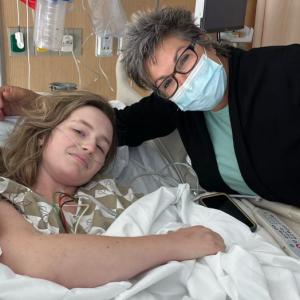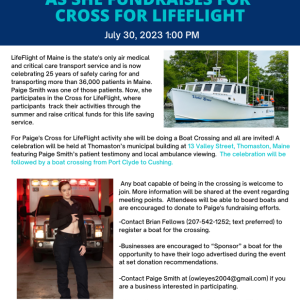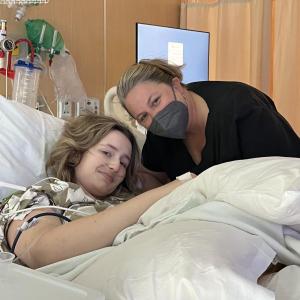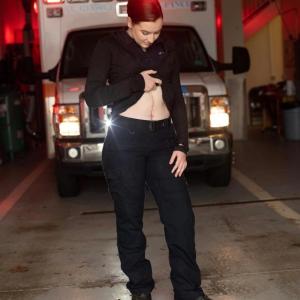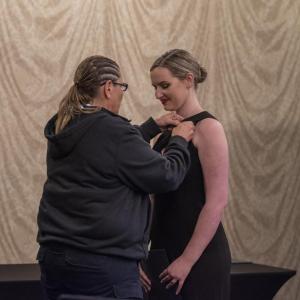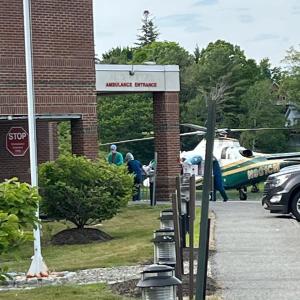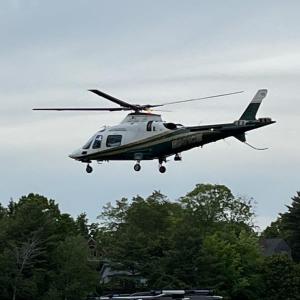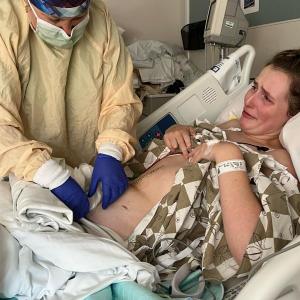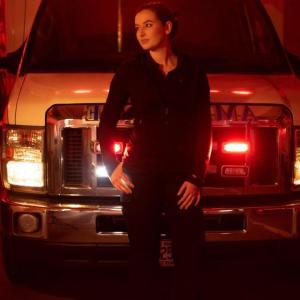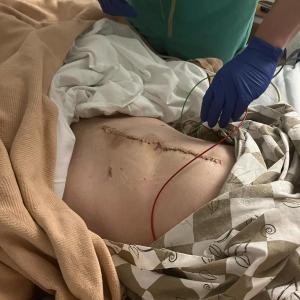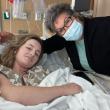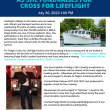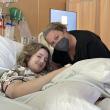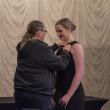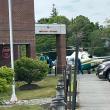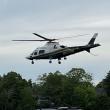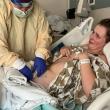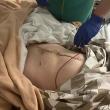From punctured aorta to paramedic, Paige Smith pays it forward for those who saved her life
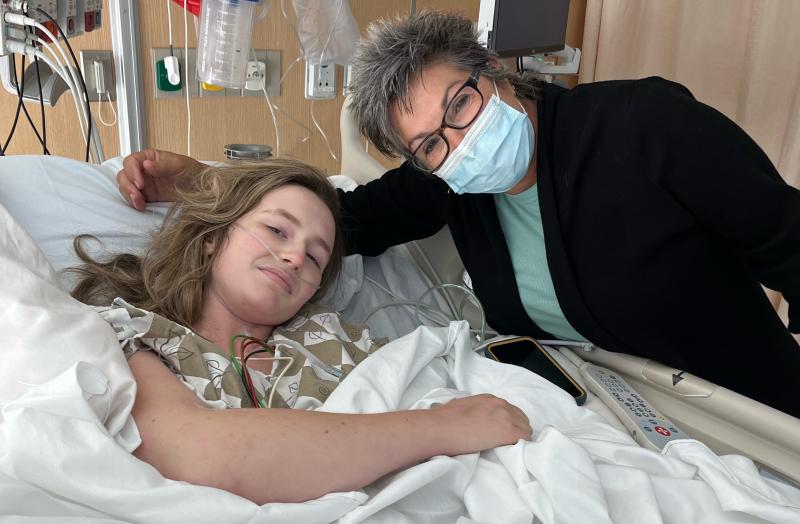 Paige at Maine Medical Center with with LifeFlight RN Lori Metayer.
Paige at Maine Medical Center with with LifeFlight RN Lori Metayer.

 Paige Smith and Maine Medical Center vascular surgeon Elizabeth Blazick, at Maine Med in 2022. (Photo courtesy Paige Smith)
Paige Smith and Maine Medical Center vascular surgeon Elizabeth Blazick, at Maine Med in 2022. (Photo courtesy Paige Smith)
 Paige Smith and her sternum to pelvis scar, the remains of the day she was cut open as surgeons desperately searched for the source of her internal bleeding. (Photo courtesy Paige Smith)
Paige Smith and her sternum to pelvis scar, the remains of the day she was cut open as surgeons desperately searched for the source of her internal bleeding. (Photo courtesy Paige Smith)
 Paige Smith is pinned by EMS educator and paramedic Amy Drinkwater, after Smith earned her paramedic license. (Photo courtesy Paige Smith)
Paige Smith is pinned by EMS educator and paramedic Amy Drinkwater, after Smith earned her paramedic license. (Photo courtesy Paige Smith)
 A LifeFlight helicopter lifts off from the hospital June 7, 2022, with Paige Smith aboard, taking her to Maine Medical Center, in Portland. (Photo courtesy Paige Smith)
A LifeFlight helicopter lifts off from the hospital June 7, 2022, with Paige Smith aboard, taking her to Maine Medical Center, in Portland. (Photo courtesy Paige Smith)
 The LifeFlight helicopter enroute June 7, 2022, with Paige Smith aboard to Maine Medical Center, in Portland. (Photo courtesy Paige Smith)
The LifeFlight helicopter enroute June 7, 2022, with Paige Smith aboard to Maine Medical Center, in Portland. (Photo courtesy Paige Smith)
 Paige Smith has special insight to the fear and distress of being a patient, having experienced vulnerability herself. (Photo courtesy Paige Smith)
Paige Smith has special insight to the fear and distress of being a patient, having experienced vulnerability herself. (Photo courtesy Paige Smith)
 Paige Smith today, as a paramedic. (Photo courtesy Paige Smith)
Paige Smith today, as a paramedic. (Photo courtesy Paige Smith)
 An incision for the history books. (Photo courtesy Paige Smith)
An incision for the history books. (Photo courtesy Paige Smith)
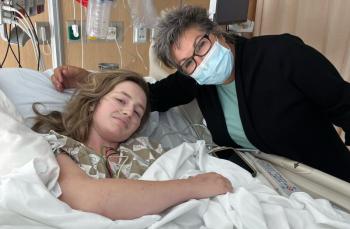 Paige at Maine Medical Center with with LifeFlight RN Lori Metayer.
Paige at Maine Medical Center with with LifeFlight RN Lori Metayer.
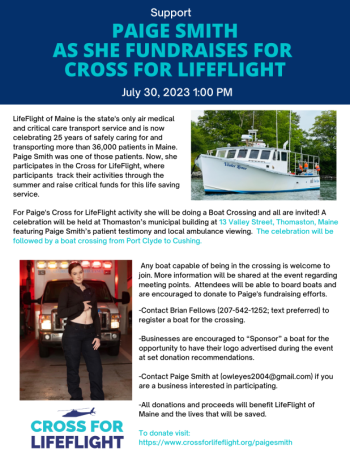
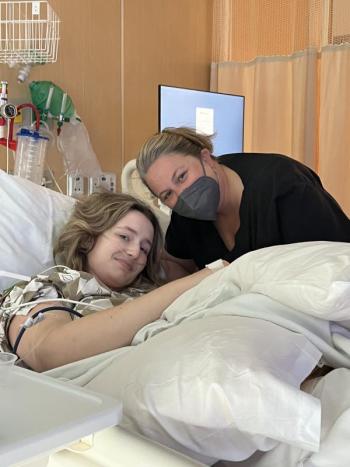 Paige Smith and Maine Medical Center vascular surgeon Elizabeth Blazick, at Maine Med in 2022. (Photo courtesy Paige Smith)
Paige Smith and Maine Medical Center vascular surgeon Elizabeth Blazick, at Maine Med in 2022. (Photo courtesy Paige Smith)
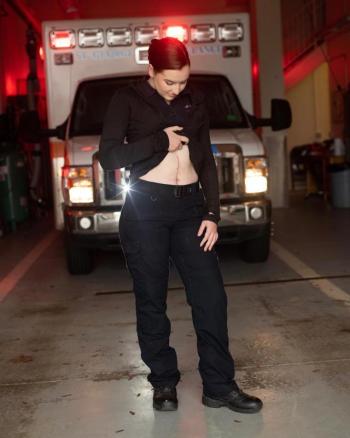 Paige Smith and her sternum to pelvis scar, the remains of the day she was cut open as surgeons desperately searched for the source of her internal bleeding. (Photo courtesy Paige Smith)
Paige Smith and her sternum to pelvis scar, the remains of the day she was cut open as surgeons desperately searched for the source of her internal bleeding. (Photo courtesy Paige Smith)
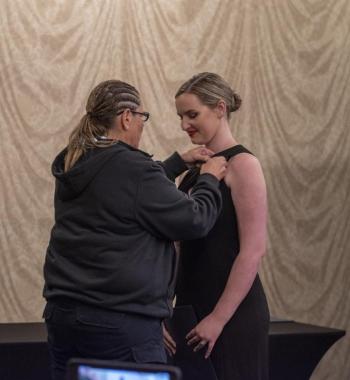 Paige Smith is pinned by EMS educator and paramedic Amy Drinkwater, after Smith earned her paramedic license. (Photo courtesy Paige Smith)
Paige Smith is pinned by EMS educator and paramedic Amy Drinkwater, after Smith earned her paramedic license. (Photo courtesy Paige Smith)
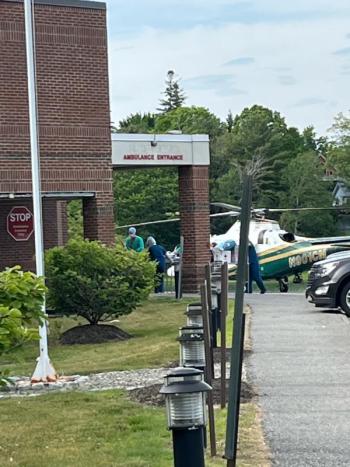 A LifeFlight helicopter lifts off from the hospital June 7, 2022, with Paige Smith aboard, taking her to Maine Medical Center, in Portland. (Photo courtesy Paige Smith)
A LifeFlight helicopter lifts off from the hospital June 7, 2022, with Paige Smith aboard, taking her to Maine Medical Center, in Portland. (Photo courtesy Paige Smith)
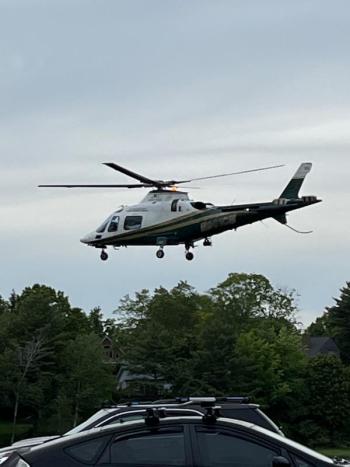 The LifeFlight helicopter enroute June 7, 2022, with Paige Smith aboard to Maine Medical Center, in Portland. (Photo courtesy Paige Smith)
The LifeFlight helicopter enroute June 7, 2022, with Paige Smith aboard to Maine Medical Center, in Portland. (Photo courtesy Paige Smith)
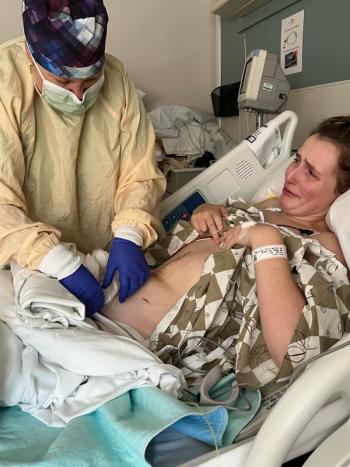 Paige Smith has special insight to the fear and distress of being a patient, having experienced vulnerability herself. (Photo courtesy Paige Smith)
Paige Smith has special insight to the fear and distress of being a patient, having experienced vulnerability herself. (Photo courtesy Paige Smith)
 Paige Smith today, as a paramedic. (Photo courtesy Paige Smith)
Paige Smith today, as a paramedic. (Photo courtesy Paige Smith)
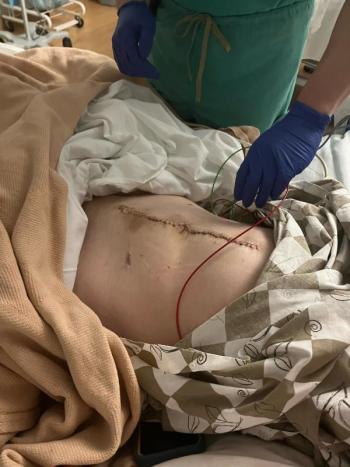 An incision for the history books. (Photo courtesy Paige Smith)
An incision for the history books. (Photo courtesy Paige Smith)
ROCKLAND — When Paige Smith woke from what she thought was routine laparoscopic surgery, she glanced over to the white board that is mounted next to every patient’s bed, and read “punctured aorta,” the only two words on it.
To the most basic EMT, that implies a host of dire circumstances, all barely survivable. And Smith, at age 19, is a paramedic. She knew immediately something had gone horribly wrong inside her body.
“I thought I was dying,” she said.
But she did not die, and she credits a team of surgeons and the LifeFlight emergency medical crews for pulling her through.
On July 30, Smith is hosting a fundraiser for LifeFlight of Maine — Maine’s only air ambulance service — both to thank them and raise awareness and money for the nonprofit. She is inviting the public to join her. The afternoon will include a flotilla of boats of all shapes and sizes crossing from Port Clyde to Cushing, and a celebration in Thomaston, at the municipal building, at 1 p.m.
For Smith to have come so far in a little more than a year of recovery, is remarkable. Add to that, she earned her paramedic license in the same 12 months and is now employed by two local ambulance services. Double remarkable.
Her scar — one long jagged line that extends the length of her stomach, is a reminder. And being grateful is an understatement for how Paige regards the care she received.
On June 7, 2022, she went to a rural hospital (she declined to talk about the hospital because Maine is a small state, and the healthcare world is even smaller) for the removal of an ovarian cyst via laparoscopic surgery. That is considered minimally invasive surgery and according to the Cleveland Clinic, “uses the aid of a laparoscope, a thin rod with a camera attached, to visualize the abdominal and pelvic cavities through tiny keyhole incisions.”
But there was, “a gross mistake,” said Smith, and during the surgery, she began to bleed, and bleed.
A general surgeon was called, who cut her open from sternum to the pelvic floor to locate the origin of the bleeding, and stop it.
“I was dying,” said Smith.
They discovered her aorta, the vital and main artery of the heart that supplies blood to the body, had been punctured. Blood was gushing out.
Maine Medical Center was called, and staff there determined she needed vascular surgeons, and an aortic graft, an artificial patch. In the meantime, while a plan was being crafted, medical teams held direct pressure on her aorta, physically stopping the bleed.
LifeFlight was called, and a crew immediately flew to Portland to pick up two vascular surgeons and the graft, and then transported them all to the rural hospital.
There, Maine Med surgeons Elizabeth Blazick and Brian Nolan went to work, incorporating the graft onto Smith’s aorta.
Outside in the waiting room, Smith’s family gathered. Her mother, Renee; her brother Ian, himself a paramedic and firefighter with Rockland Fire and Rescue; and her father, Ken, a police officer with Thomaston PD, and trained paramedic.
“My mother was first notified about my injury when the surgeon came to her with tears in her eyes,” said Smith. “Once LifeFlight had brought the surgeons in and they repaired my aorta, my mother anxiously waited with my family members, who had now arrived to spend what they believed to be my last few minutes on earth. Dr. Blazick came out of surgery and said, ‘we saved her.’ I was far from out of the woods but this hope was purely a gift from LifeFlight and the vascular surgeons.”
No stranger to health issues, Paige Smith has known from age 12 that she wanted to be a paramedic. At 17, she was diagnosed with Ehlers Danlos Syndrome, a chronic degenerative disease of the connective tissue. She knows the value of good medical care.
“I never let this hold me back because I was determined to bring awareness to my disease and help people like I had been helped in the past,” she said. “I grew up with complex cardiac issues since I was 12 years old and I knew from that point on that I wanted to be a paramedic. Life only got more complicated from that day on; however I wouldn’t change it for the world because it’s brought me to where I am today.”
After the surgeons stapled Smith’s long incision, sewing her abdomen back together, she was loaded onto a stretcher and flown to Maine Medical Center.
By her side was LifeFlight Registered Nurse Lori Metayer, for whom Smith has nothing but admiration.
“Lori came to see me the next day after my flight,” said Smith. “I was her last flight before she retired. She is truly an angel.”
Smith remained at Maine Med for nine days while doctors and nurses monitored the graft. Because of EDS, there was an increased risk of it tearing from the artery, but it held just fine and will remain on her aorta the rest of her life.
Last month, just one year after her ordeal, Smith earned her paramedic license. While she was healing, she hit the books, taking her EMS training from EMT to a more advanced level. She was determined to move forward.
On July 30, she will be leading the Boat Crossing from Port Clyde to Cushing, a symbolic passage is support of LifeFlight’s mission to help provide critical care and rapid transport of the ill and injured.
Boats of all shapes and sizes are welcome to join. To register a boat for the crossing, contact Brian Fellows, 207-542-1252 (text preferred). Businesses are encouraged to sponsor a boat; contact Smith at owleyes2004@gmail.com for more information.
Just prior to the crossing, a celebration will be held at the Thomaston municipal building, 13 Valley Street, in Thomaston on July 30, and will feature testimony from Smith and Metayer.
Today, Smith is a paramedic working with the St. George Ambulance Service as well as Waldoboro EMS. And some day, she may herself work with LifeFlight. She is a survivor and now helps other survive.
Reach Editorial Director Lynda Clancy at lyndaclancy@penbaypilot.com; 207-706-6657

